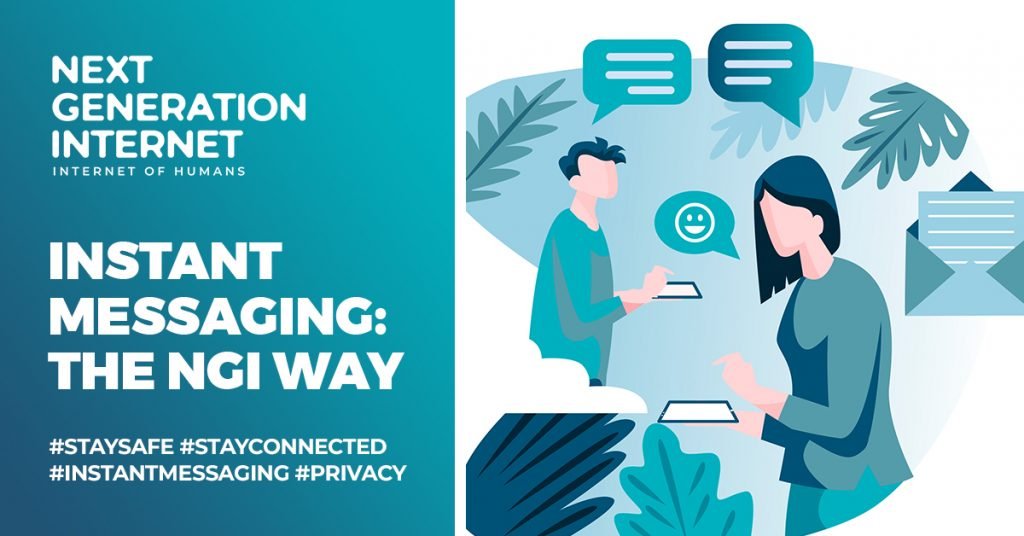Since the outbreak of the COVID-19 pandemic, we have all realised how critical it is to have the right communication tools in place to remain connected to each other. However, as we become more aware of and attached to our privacy rights, we also become more attentive to the conditions of use of our communication tools. In other words, it is not only important that the tools work but we want to know how they work. We need to trust the communications channels we use in our social circles, in particular private messages among individuals and groups.

While certain popular messaging services may deliver core functionality, they show little concern for interoperability and privacy. In fact, a great deal of metadata (for example phone numbers, location information, mobile device information) may be shared with third-parties. By their very nature, we carry around these applications with us the entire day, and they may reveal a lot about ourselves. Who reads the terms of service? Most people don’t, but even so, users typically have fewer rights than they think. For example, if providers want to withdraw a user account, they simply can do so.
Instant messaging is essential to the everyday life of millions of citizens, and for this reason, it is among the areas where the Next Generation Internet initiative is investing to deliver a concrete, trustworthy technology alternative to the end-users.
Instant messaging – Alternatives are possible and they are ready to use
Some of the tools we support:
XMPP or Jabber is the designated Internet standard for instant messaging, essentially working in the same federated way as email. NGI funds several initiatives on XMPP to add the latest security features, so users have a choice of clients to pick and find out what suits them best: Kaidan and Conversations (mobile client for Android), Dino (desktop), Movim (web client), Libervia (all devices). All of these are free and open source applications, so they can be further customised.
Deltachat is a robust and user-friendly app users can start using instantly with their existing infrastructure. It looks and feels like a normal chat client, including encrypted private messages, threads and group chats – but instead of signing up to an unknown server abroad, users use a server they already trust: their mail server.
Another interesting protocol is Matrix. NGI is funding Fractal, a group messaging app for the desktop and Linux based mobile operating systems. The community has produced many more apps, including Element which can be used on mobile phones, desktop and the web.
Sylk Suite initially was an open source conferencing server, but has been developed into a well-featured video calling application. Sylk is on its way to offering group messaging based on the SIP Simple standard – which means that you can use it to fully replace other popular messaging services with a privacy friendly alternative – and is compatible with the majority of the Internet telephony providers.
To engage with a more open community, users might want to consider using a ‘golden oldie’: IRC. NGI supports KiwiIRC, a modern web client for IRC that makes it easy to chat with larger numbers of participants. Users can choose one of the many free IRC providers around, or host their own.
In case full anonymity is needed, it is possible to use Ricochet Refresh: an open source project to allow private and anonymous instant messaging. Ricochet Refresh is the work of an international organisation supporting whistleblowers.
There are solutions which can run offline too:
Manyverse is a social networking mobile app, implemented on a peer-to-peer network (‘Secure Scuttlebutt’), rather than a typical cloud service. The mobile app locally hosts the user’s database, allowing them to own their personal data, and also use the app when offline.
Briar is a secure messaging app designed for activists, journalists and civil society groups. Instead of using a central server, encrypted messages are synchronised directly between the users’ devices, protecting users and their relationships from surveillance.
switching to a new solution

It is important to understand and appreciate that there is a form of ‘social lock-in’ in place. If many people have a popular commercial instant messaging app installed, and it is available for free, it actually takes some effort for a group to switch to an alternative solution. But in the end, if we are all unhappy with the state of play, we are the only ones who can decide together to opt out!
The functionality we need is far from rocket science, as the above list of alternative solutions proves, and there are many more of them. If we want a healthy Internet, we simply cannot let a “winner takes all” scenario happen. Let’s start promoting fair, robust and trustworthy technologies, that operate transparently and behave as the society expects the Internet to behave: in a way that responds to our fundamental needs, including trust, security and inclusion, and in general reflects the values and the norms that we enjoy in our societies.
Stay safe and stay connected!
Download our “Instant messaging – The NGI way” press releases here below:
- Instant messaging – The NGI way (EN – PDF)
- Neue Sofortnachrichtendienste, entwickelt mit der Unterstützung der EU-initiative Next Generation Internet, stellen die Privatsphäre der Nutzer in den Mittelpunkt (DE – PDF)
- La vie privee des utilisateurs au cœur des nouveaux services de messagerie instantanee developpes avec le soutien de l’initiative de l’ue sur l’internet de nouvelle generation (FR – PDF)
- La privacy degli utenti al centro dei nuovi servizi di messaggistica istantanea sviluppati con il sostegno dell’iniziativa Internet di prossima generazione dell’UE (IT – PDF)
- La privacidad del usuario se sitúa en el centro de los nuevos servicios de mensajería instantánea desarrollados con el soporte de la iniciativa europea Next Generation Internet (ES – PDF)
- A privacidade do utilizador na essência dos novos serviços de mensagens instantâneas desenvolvidos com o apoio da iniciativa «internet da próxima geração» da união europeia (PT – PDF)
- Användarnas privatliv står i centrum för de nya snabbmeddelandetjänster som tas fram med stöd från eu:s initiativ Nästa Generations Internet (SV – PDF)
- Zasebnost uporabnikov v osrčju novih storitev takojšnjega sporočanja, oblikovanih s podporopobude eu za Internet Naslednje Generacije (SL – PDF)
- Súkromie používateľa ako ústredný prvok nových služieb rýchlych správ vyvinutých s podporou iniciatívy eú internet ďalšej generácie (SK – PDF)
- Поверителността на потребителите е в основата на новите услуги за незабавни съобщения, разработени с подкрепата на инициативата на ес за интернет от следващо поколение (BG – PDF)
- Protecția vieții private ocupă un rol central în ceea ce privește noile servicii de mesagerie instantanee dezvoltate cu sprijinul inițiativei Next Generation Internet (NGI) a UE (RO – PDF)
- Ochrona prywatności użytkownika nieodłącznym elementem nowych komunikatorów opracowanych przy wsparciu ze strony inicjatywy UE Next Generation Internet (PL – PDF)
- Privacy van gebruikers centraal in nieuwe instant messaging-diensten die zijn ontwikkeld met steun van het EU-initiatief Next Generation Internet (NL – PDF)
- Lietotāju privātums kā prioritāte jaunos tūlītējās ziņojumapmaiņas pakalpojumos, kurus izstrādā ar es nākamās paaudzes interneta iniciatīvas atbalstu (LV – PDF)
- Naujų tikralaikio pokalbio paslaugų, sukurtų pasitelkus es iniciatyvą „Naujos Kartos Internetas“, pagrindas – vartotojų privatumas (LT – PDF)
- A felhasználók magánszférájának védelme áll az eu újgenerációs internet kezdeményezésének támogatásával kifejlesztett új, azonnali üzenetküldési szolgáltatások középpontjában (HU – PDF)
- Korisnička privatnost u središtu novih servisa za razmjenu izravnih poruka razvijenih uz potporu inicijative eu-a internet sljedeće generacije (HR – PDF)
- Käyttäjien yksityisyydensuoja etusijalla eu:n seuraavan sukupolven internet -aloitteen tuella kehitetyissä uusissa pikaviestipalveluissa (FI – PDF)
- El-i järgmise põlvkonna interneti algatuse toel arendatud uute sõnumivahetuse teenuste keskmes on kasutaja eraelu puutumatus (ET – PDF)
- Η ιδιωτικοτητα των χρηστων στο επικεντρο των νεων υπηρεσιων ανταλλαγης αμεσων μηνυματων που αναπτυχθηκαν με την υποστηριξη της πρωτοβουλιας της εε για το διαδικτυο επομενης γενιας (NGI) (EL – PDF)
- Brugernes privatliv er det vigtigste i de nye instant messaging-tjenester, som er udviklet med støtte fra EU’s initiativ om den Næste Generation af Internet (DA – PDF)
- Soukromí uživatele jako základní kámen nových služeb pro zasílání rychlých zpráv vyvíjených za podpory iniciativy EU Next Generation Internet (CS – PDF)














